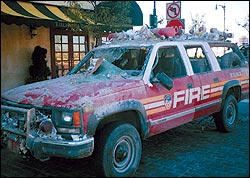
The one need they talked about was blood. I had a body full of it, more than I needed. At 4 in the afternoon, I left my apartment again (using the elevator) and walked to the Red Cross center two miles south. The streets were no longer crowded. Outside a drug store, a group of cops loaded boxes of batteries onto a truck.
The plaza in front of the Red Cross center was swarming with people. Workers didn't need any more blood except for negative types, but encouraged donors to return the next day. People passed out forms for those who wanted to do volunteer work.
I took a form and stood in line to be interviewed. The line curved around the corner, and around the next corner as well. But it moved quickly, and soon I was in a high school auditorium with hundreds of others. A woman in her 20s asked if I had any special skills, specifically medical or therapeutic. Since comedy writing wasn't the kind of therapy they needed, I mentioned my two years with the Los Angeles Sex Information Helpline. This also wasn't quite the skill they needed, but at least it showed that I had counseling experience.
Back in my neighborhood, I looked inside my local supermarket again. All of the bread shelves were empty.
WEDNESDAY
When I walked through my neighborhood, the sidewalks were filled with the usual numbers of people shopping and going about, but the streets were still eerily empty of cars. Every conversation I had touched on what had happened and how we felt, be it with friends, or neighbors, or strangers in the sauna at my health club. A friend reminded me about the beginning of my play, Shedding Light, set in Manhattan just before the millennium, when a highly anxious woman hears an explosion in the distance and fears the worst. "It's what, 10 days, nine days before the millennium," she says in the script, "and I would've been sure some crazy who didn't have the patience to wait till New Year's Eve exploded a bomb."
I had written that line to reveal how paranoid the character was. But as my friend said, "What was paranoid then, isn't anymore."
Everyone asked if Amy were helping the injured. Her skills as an obstetrician weren't useful at Ground Zero. She was still busy at the hospital, though, delivering babies. Despite recent events, they refused to stay in their wombs.
I thought I felt fairly normal inside, but when I began conversations with people in the elevator, I had a hard time completing sentences. When I looked out my window and saw a pigeon fly directly towards the side of my apartment building, my body responded as if it were a small missile.
THURSDAY
The first effects of shock were wearing off. When I read the newspaper or watched TV, I had moments of excruciating sadness. I also began to feel anger. Those thugs attacked my home.
I needed to get out of my apartment, so I grabbed my camera and got on the subway, which let me off in the heart of Greenwich Village. The streets were empty of traffic. The few people walking around moved casually, without the usual hustle and bustle.
 The
air had a slightly burnt odor, but there were no ashes or debris that had
wafted this far, about two miles north of where the World Trade Center had
stood. A few people wore air filter masks they had purchased at a local
hardware store. On one block, the burnt odor wasn't as strong as the more
common New York summer aroma of urine.
The
air had a slightly burnt odor, but there were no ashes or debris that had
wafted this far, about two miles north of where the World Trade Center had
stood. A few people wore air filter masks they had purchased at a local
hardware store. On one block, the burnt odor wasn't as strong as the more
common New York summer aroma of urine.At Washington Square Park, an ad-hoc tribute had been created on the fence surrounding the Arch: thoughts, prayers, and photos of the missing were taped to the mesh, with flowers and candles on the ground. People stood quietly reading the various notes, and two men in yarmulkes quietly said Kaddish.
I walked down to Houston Street, where police had set up barricades, allowing pedestrians to go south of that point only if they could prove they lived there. People showed their drivers' licenses and were immediately allowed to pass. One man about to leave the area explained that he was apartment-sitting for friends and couldn't prove he lived there. He showed an envelope with the address; the cop assured him he'd be allowed to return.
Every interaction that I witnessed between cops and civilians was polite and cordial. It was as if the pendulum had finally swung 180 degrees from the Vietnam era, when cops were presumed to be pigs, and the types who lived in lower Manhattan were perceived as threats to the system. It was also different from most of the interactions I had witnessed between police and civilians in Third World countries, where civilians are intimidated and police usually want to keep them that way.
Turned away were those who hoped to look around the rescue site or who said they wanted to help. One of those refused entrance was a Nigerian man of about 30. He carried two photos of his best friend and his wife who had been married at City Hall in 1999. The wife had left for work at the World Trade Center on Tuesday and never returned. The man promised his friend that he would look for her.